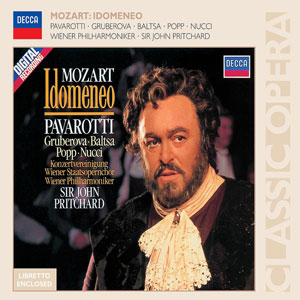Mozart Idomeneo
View record and artist detailsRecord and Artist Details
Composer or Director: Wolfgang Amadeus Mozart
Genre:
Opera
Magazine Review Date: 4/1988
Media Format: CD or Download
Media Runtime: 184
Mastering:
DDD
Catalogue Number: 411 805-2DH3

Tracks:
| Composition | Artist Credit |
|---|---|
| Idomeneo, Re di Creta, 'Idomeneo, King of Crete' |
Wolfgang Amadeus Mozart, Composer
Agnes Baltsa, Idamante, Soprano Edita Gruberová, Elettra, Soprano John Pritchard, Conductor Leo Nucci, Arbace, Baritone Lucia Popp, Ilia, Soprano Luciano Pavarotti, Idomeneo, Tenor Nikita Storozhev, Oracle, Bass Timothy Jenkins, High Priest Vienna Philharmonic Orchestra Vienna State Opera Concert Choir Wolfgang Amadeus Mozart, Composer |
Composer or Director: Wolfgang Amadeus Mozart
Genre:
Opera
Magazine Review Date: 4/1988
Media Format: Cassette
Media Runtime: 0
Mastering:
DDD
Catalogue Number: 411 805-4DH3

Tracks:
| Composition | Artist Credit |
|---|---|
| Idomeneo, Re di Creta, 'Idomeneo, King of Crete' |
Wolfgang Amadeus Mozart, Composer
Agnes Baltsa, Idamante, Soprano Edita Gruberová, Elettra, Soprano John Pritchard, Conductor Leo Nucci, Arbace, Baritone Lucia Popp, Ilia, Soprano Luciano Pavarotti, Idomeneo, Tenor Nikita Storozhev, Oracle, Bass Timothy Jenkins, High Priest Vienna Philharmonic Orchestra Vienna State Opera Concert Choir Wolfgang Amadeus Mozart, Composer |
Author: hfinch
Longwindedness is its hallmark. Now Sir Colin Davis (Philips) includes Idomeneo's ''Torna la pace'' and Elettra's ''D'Oreste, d'Aiace'', both of which were deleted by Mozart for dramaturgical reasons. But he trims the recitative, ensures its impetus, and races with the opera's pulse from start to finish. Pritchard gives us almost every available note and takes as long to do so as is humanly possible. Like Harnoncourt (Teldec), he allows Arbace his aria, but Leo Nucci, albeit a convincing elder statesman, makes pretty heavy weather of it. He gives both Idomeneo and Elettra their extra arias; but also retains Idamante's ''No, la morte''. Mozart, before the first performance, wisely removed this obstacle to a speedy denouement; but Pritchard, whose interminable ''Placido il mar'' has already warned us of his addiction to long farewells, spins out the agony to the last syllable of recorded time. He gives The Voice a good run for its money, too: Nikita's Storojew's stentorian pronouncements must form one of the most stirring dei ex machina on disc, with full trombone and horn accompaniment to the longest of Mozart's three versions.
All of this would matter less if the entire production were not calculated to drain the opera of the last drop of its dramatic life-blood. Not only are Pritchard's tempos slow (almost unendurably so in the recitative) but his handling of the Vienna Philharmonic irons out much of the nervous accuity of Mozart's writing. Where Davis creates impetus by parting and matching orchestral textures with fine sensitivity, and where Harnoncourt achieves momentum by penetrating the nerve system of rhythms, accents and inflexion Pritchard prefers to mollify and homogenize. The echoy-acoustic of Vienna's Sofiensaal, and a recording balance which embraces the bass and masks the all-important woodwind, hardly helps.
This seems a cast chosen for the resonance of its names rather than the relevance of its vocal character. Not one singer manages to focus that classical conflict of joy and pain, content and fear compressed simultaneously in Mozart's writing, particularly in the music of Ilia and Idamante. Lucia Popp sings with poignancy and plangency: this is a sympathetic performance but with much of its anxiety and pain too easily assuaged by Pritchard's pacing and soft-focus accompanying. Agnes Baltsa's achievement is, unusually, vocal rather than dramatic. The voice is smoothly integrated; the presence strangely distanced. Her ''Non ho colpa'' and ''II padre adorato'' are uncharacteristically numb compared with the living lines of Trudeliese Schmidt (for Harnoncourt).
Neither she nor Gruberova is under the skin of their respective roles. Gruberova's Elettra has the measure of the music's brilliance, and her ''Idol mio'' shows the glow of joy which surfaces momentarily. But hers are tantrums not furies (a miscalculation comparable to that of the Orestes in Jonathan Miller's recent Andromache); and both Pauline Tinsley (Davis) and Felicity Palmer (Harnoncourt) avoid the pitfall. Pavarotti is Idomeneo: enough said. His is a deeply committed performance, revealing the king's greatness of heart and his just raging in a larger-than-life portrait. But it functions outside the scale of the work while bringing no more thrills to ''Fuor del mar'' than are provided by either George Shirley (Davis) or Wemer Hollweg (Harnoncourt).'
Discover the world's largest classical music catalogue with Presto Music.

Gramophone Digital Club
- Digital Edition
- Digital Archive
- Reviews Database
- Full website access
From £8.75 / month
Subscribe
Gramophone Full Club
- Print Edition
- Digital Edition
- Digital Archive
- Reviews Database
- Full website access
From £11.00 / month
Subscribe
If you are a library, university or other organisation that would be interested in an institutional subscription to Gramophone please click here for further information.





